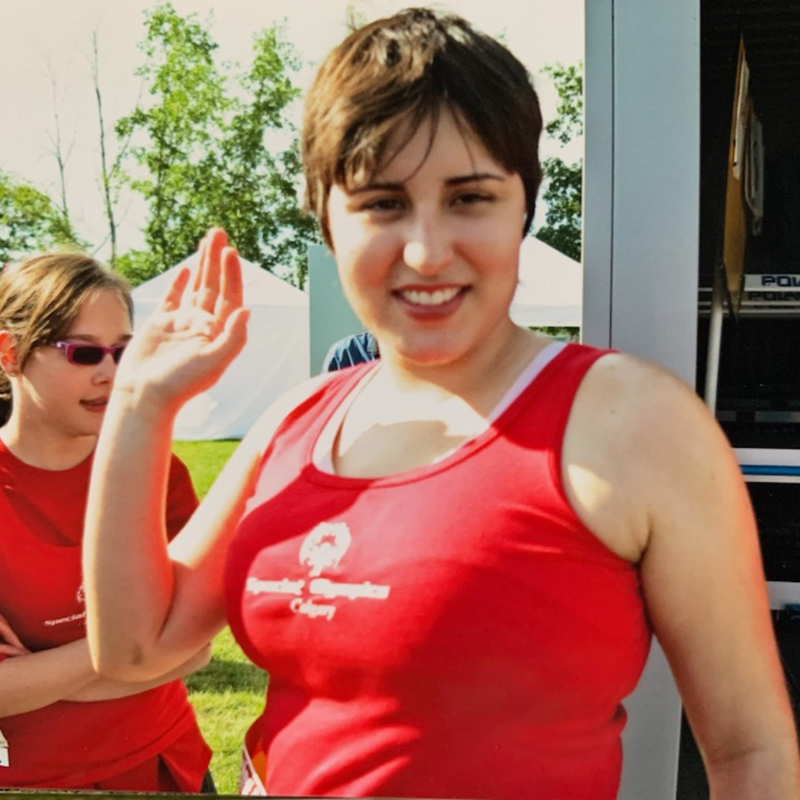By Sarah Spisak
The air is thick and cold, but the silence of the early morning winter is calming as cars pull up to the Lake Bonavista Figure Skating Club on the south side of Calgary. Every Thursday morning at 6 a.m., JorDen Tyson and her mom, Trish, arrive for two hours of figure skating practice; the start of JorDen’s busy day as an athlete.
JorDen stands out on the ice. She’s well put together wearing all black, her dark hair pulled back into a tight French braid. The shirt she wears has a saying one of her coaches always tells her: Practice like you’ve never won. Perform like you’ve never lost.
JorDen has been skating at the Bonavista Figure Skating Club for more than 10 years and has grown up skating with many of the other skaters. She started skating when she was 17 through Special Olympics Alberta Calgary and it was a perfect fit for JorDen, who has been a dancer since she was seven years old.
“JorDen is part of the family here,” Trish says. “They’ve grown up with her.”
“When Jordy was born, she was perfect. There was nothing wrong,” Trish says.
“I remember we went down to Mexico, and we were on this pirate ship, and she was dancing to the music, and she was loving everything that was going on around her. It was like everything revolved around her and she was just this amazing little kid.
“Then, all of a sudden, when she was 20 months old, she became autistic, and everything changed.”
On September 7, 1995, JorDen stopped talking.
“September 9 she was gone. And the light left, and it was devastating because we thought she was losing her hearing,” Trish says.
Trish and her husband Paul took JorDen to the children’s hospital and she was seen right away.
On November 23, 1995, JorDen was diagnosed as being on the autistic spectrum. Back then, the probability of having someone on the autistic spectrum was 1 in 10,000 and for girls it was even less.
“We didn’t know what to expect,” Trish says. “We didn’t know what it was and all you saw was Rain Man and people that weren’t part of society and that wasn’t what I wanted for my daughter. And I thought ‘what are we going to do for her? What are we going to make her life like?’”
When JorDen was diagnosed, she went into the Society for Treatment of Autism where she began getting treatment.
“It was constant, absolute treatment to get her the best we could, and it was hard because I didn’t know what my dreams would be for her or what her dreams would be, if she would have dreams,” Trish says.
“But she did get them."
Growing up, JorDen faced many obstacles due to her disability.


“You know JorDen might hit a kid so, they didn’t want her there, or their insurance didn’t cover her so she couldn’t do gymnastics, or the ballet, they didn’t want her there anymore because they said she would never be a ballerina and they were training ballerinas,” Trish says.
JorDen was also unable to join her high school track and field team. But it was those obstacles and closed doors that eventually led her to joining Special Olympics Alberta Calgary.
“I thought, you know, like any other parent they can go to their high school coach and say, ‘You know what, my kid wants to do track and field.’ When Jorden said that the coach said, ‘Sorry, I don’t have room and I don’t have time to teach your child who’s not an athlete track and field, but if you find someone that is willing to coach her then she can participate.’
“I was so angry, and some parents talked to me and said, ‘Trish there’s Special Olympics.’”
JorDen started out with Special Olympics doing track and field and loved it. She had found a place where she didn’t have to try to fit in, she just fit.
When the time came to choose another sport, JorDen had her heart set on figure skating.
“It’s dancing on ice,” JorDen told her mom.
When JorDen began figure skating at 17, she didn’t know how to skate, but that didn’t stop her from becoming a dedicated and top athlete.
Since starting figure skating with Special Olympics, JorDen has competed in provincials, nationals, and worlds, taking home the gold medal in Austria in 2017.
“She was doing her solo and the coach had timed it so well. People were clapping and they were just being part of the whole experience,” Trish says. “You just saw everyone participating and clapping for her and she loved the limelight, and she was so happy.
“There was this joy in her that hadn’t been in her in a long time.
"When she’s on the ice, there’s JorDen.”
When asked what she wishes for JorDen’s future, Trish says that more than anything she wants JorDen to be happy.
“I want JorDen to be happy whatever that dream may be," Trish says. "And probably still be part of Special Olympics because I think it just allows them to dream."